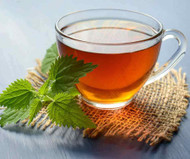April 14, 2023
How to Improve Digestion
One's diet, lifestyle, and health conditions can all have an impact on their digestive system, which can ultimately affect their quality of life. As we age, our digestion process may slow down, resulting in issues such as bloating, discomfort, and constipation. However, incorporating the healthiest drinks into our routine can be a natural and effective way to improve digestion. Consider trying some of these drink options to help you or your loved one's digestive system get back on track.
When it comes to our meals, we all want to ensure that our food is being digested effectively, whether it's a small snack or a full meal. Research has shown that a healthy gut can lead to improved well-being, appearance, and performance. If you're looking to improve your digestion, incorporating one or more of these nutritious drinks into your diet may be a great place to start.
1. Water
Having trouble with your digestive system? One of the best ways to improve digestion is by drinking enough water and staying hydrated. This not only enhances muscle function but also helps your body process nutrients faster, leading to more efficient bowel movements. However, the question remains, how much water should you drink? Normally, healthy individuals should aim for 8-9 cups of water per day, but this can vary based on caffeine consumption, medications, and individual needs. It's always best to consult with a doctor to determine the ideal amount of water for you or your care recipient.
2. Ginger Tea
If you're looking for the best drink to improve digestion, herbal teas are a great option, with ginger being a standout plant for constipation and a favorite among herbalists. A warm cup of ginger water before or during a large meal can work wonders for your digestive health by preventing heartburn, stomachache, and indigestion. The reason is simple: ginger root stimulates the production of saliva, bile, and gastric juice, which enhances the breakdown of the food you consume.
3. Lemon Water
Drinking lemon water before meals may have multiple health benefits, especially for digestion. Research indicates that the citric acid present in lemons can increase the secretion of stomach enzymes that assist in the digestion and breakdown of food. Along with this, lemon juice is rich in vitamin C, which can help indigestion relief. The nutrient also softens stool, making the final phase of digestion more comfortable.
Incorporating this practice into your daily routine is easy. All you need to do is warm a glass of water, add a teaspoon of lemon juice, and drink it before meals to keep your digestive system healthy. However, if you or your loved ones are struggling with GERD or acid reflux, it's essential to consult a doctor before adding lemon water to your daily routine.
4. Kombucha Tea
What is Kombucha? it is a bubbly, slightly acidic beverage made by yeasts fermentation and bacteria with sweetened tea. what are its health benefits? kombucha is packed with probiotics, which are beneficial live bacteria that promote a healthy gut and digestive system. Probiotics have been associated with a range of health benefits, including boosting the immune system, regulating blood sugar levels, reducing inflammation, and more. Lemongrass tea not only has a delicious taste but also offers numerous benefits for digestion. This tea has been used in Chinese medicine for centuries to aid in reducing symptoms of bloating and constipation. The compound citral found in lemongrass provides anti-inflammatory benefits that help soothe the stomach and maintain regular digestive functions. In addition, being caffeine-free makes it the perfect choice for a relaxing after-dinner beverage or a night time tea.
6. Peppermint Tea
What is peppermint tea good for? Peppermint is a herb that has been cherished for its delightful minty flavor and health-boosting properties for centuries in Europe and Asia. Among other peppermint tea health benefits, it contains natural chemicals that can aid the digestive tract by easing spasms in the gut, resulting in a more relaxed body that can process food more efficiently. As a result, it has been found to have potential effectiveness in addressing Irritable Bowel Syndrome (IBS).
7. Coffee
Aside from providing an energy boost, your morning cup of coffee might also serve as a digestive stimulant. As a laxative, coffee aids in moving things quickly in your gut. While it may help regulate your bowel movement, relying solely on it for digestion is discouraged. Excessive caffeine intake may lead to diarrhea, which is not only uncomfortable but also prevents certain nutrients from being absorbed by the body. Moreover, excessive caffeine consumption has been linked to sleep disruption, making it advisable to avoid drinking coffee after 3 p.m.
A pro tip for added health benefits is to put 10 grams of collagen powder into your morning coffee for additional protein. Collagen is a crucial protein for the proper functioning of our joints, ligaments, tendons, and skin, and it also promotes gut health.
8. Fennel Tea
Fennel is a great herb for digestion. It helps with constipation, gas, and other symptoms of poor digestion that lead to bloating, pain and discomfort. Fennel has long been used to treat digestive problems like gas, bloating from too much gas or too little movement in the colon, and pain associated with constipation. Fennel seeds can be eaten whole or ground into flour and added to breads or crackers—or even mixed into a smoothie! They're also helpful for making tea: simply crush the seeds and steep them in hot water for 10 minutes.
Do you want to try some new herbs? Great! But before we get started, we need to make sure you're aware of the risks. It's important to note that consuming herbs can lead to unexpected interactions with certain medications. If you're taking any medications, it's best to consult with your doctor before adding them to your diet.

